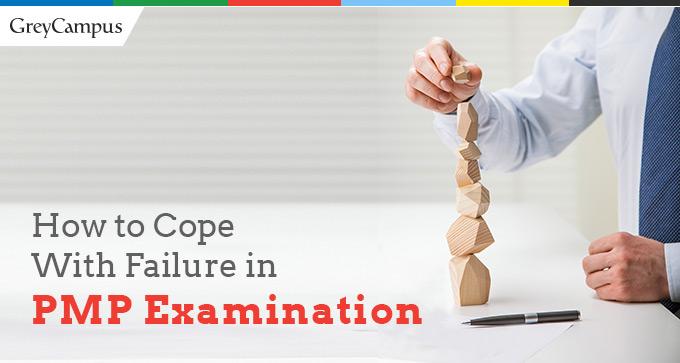How to Cope With Failure in PMP Examination
Project Management Professional (PMP) is not an easy exam to attempt. Lasting for 4 hours, it has 200 multiple choice questions, of which one has to answer at least 106 correctly to qualify. The exam is designed to be extremely difficult so that only the best candidates can get the certification. This is the reason why PMP holds immense value and its
certificate holders get paid handsomely.
Another interested fact put across by
Project Management Institute (PMI) is that approximately 80 percent of PMP exam takers fail at their very first attempt. Though this revelation should prevent aspirants from getting disheartened with failure, it is not a good place to be in. Yes, handling of poor results and disappointment can get to even the best of candidates and make them lose their confidence.
Let us look at some ways to cope with failure in PMP Exam.
Methods to Cope With Failure
Analyze Shortcomings and Work on Them
If an
online examination is taken, the results are given out as soon as the exam gets over. Ready declaration of results gives you an idea of which sections were performed badly and which need more work. Once these areas are identified, the first step should be to tackle the sections that you struggled with. It’s necessary to take simulation exams where you can clearly identify the problem areas, and work upon them till you get them right. Initially, it is important not focus too much on the areas where you performed well, however you cannot ignore them completely.
Ditch Overconfidence and Under-Confidence
Raking up years of experience does not necessarily mean that one will clear the
PMP examination in the first attempt itself. This over-confidence can be one of the primary reasons of failure, especially if the right amount of preparation has not been put in. On the other hand, loss of confidence proves to be detrimental as well. So, it’s essential to maintain a balance between over-confidence and under-confidence. Both these situations come in the way of success at the second or third attempt as well. So, it’s best to have a positive attitude and approach the next step with the right levels of confidence in place.
Gather Appropriate Study Material
If you have failed once, re-evaluate all the study material. If you are falling short, take assistance of more study material and
PMP training sessions to get better results. Refer to online content, simulation exercises, workbooks and courses. Take numerous mock tests and improve your chances of getting a better score. Don’t let the amount of study material bog you down, the more you have, the better it would be for you. So gather all the appropriate study material and get started.
Understanding the Pattern of Questions
One way of cracking the
PMP examination is to gain a clear understanding of the pattern of the question paper. It is important to have adequate knowledge of the importance of each section and the questions allotted to them. Usually, the questions are assigned based on the time spent by a
project manager in each domain.
- Initiation – 13%
- Planning – 24%
- Executing – 30%
- Monitoring and Controlling – 25%
- Closing – 8%
The numeric score gives any of the following results:
- Proficient (above-average score)
- Moderately Proficient (an average score)
- Below Proficient (below-average score)
A ‘Below proficient’ score indicates that one requires a lot of preparation as it equates to failure in corresponding tests too.
Strategize and Prioritize
Panicking after failing the PMP is a sure-shot recipe for disaster. Instead, take a step back and strategize the next step. Do a thorough SWOT analysis by listing out the strengths, weaknesses, opportunities and threats that dominated your success. Prioritize where you need to focus first and quit procrastination. Prepare the strategy that works for you and stick to it for best results.
Way Forward
Do keep in mind that only three attempts are allowed for passing the exam, and with one-year
eligibility. Candidates who fail to clear the exam in these three chances have to wait for another year before attempting again. In the meantime, it is possible to apply for other
PMI credentials. After going through three failed attempts, candidates are required to pay the defined re-examination fee to be eligible to give the examination again.
It’s crucial that failure (or the fear of it) should not keep you from bouncing back into action. Mulling over failure for too long is the wrong way to go about the act; rather, the need of the hour is to focus on getting ready for the next attempt. Just prepare well and success will not be too far away!
Good luck.
Author : Uma Daga
Click Here for PMP Course
